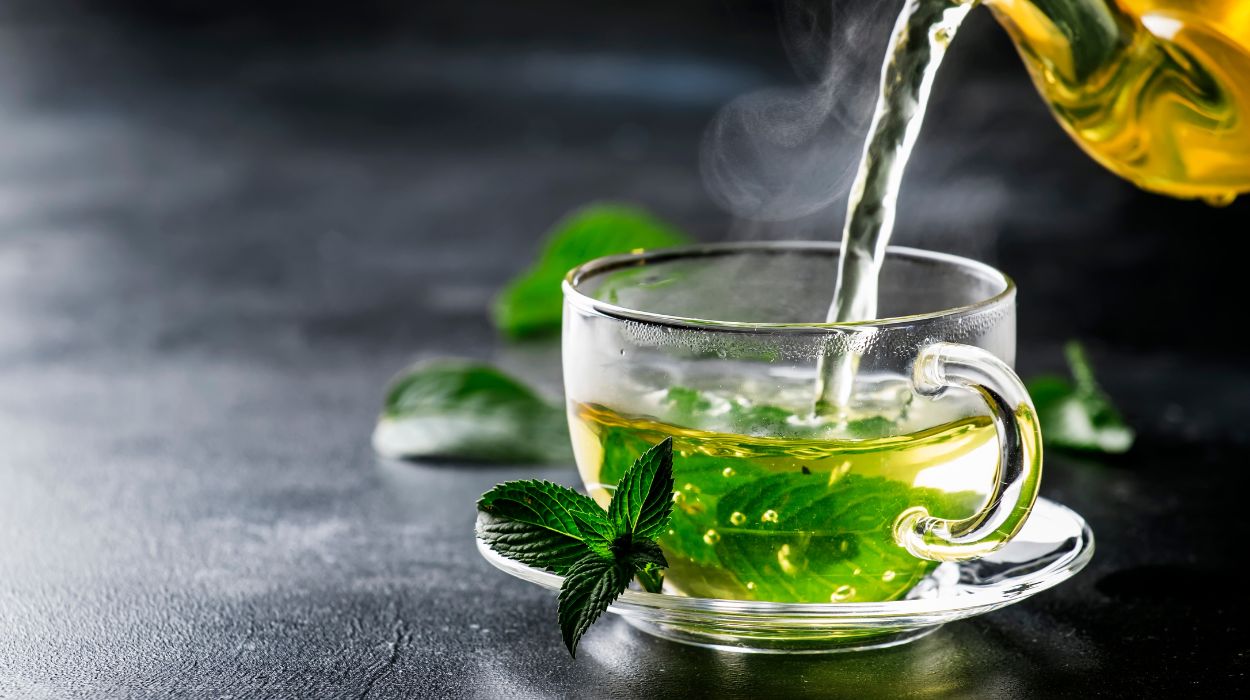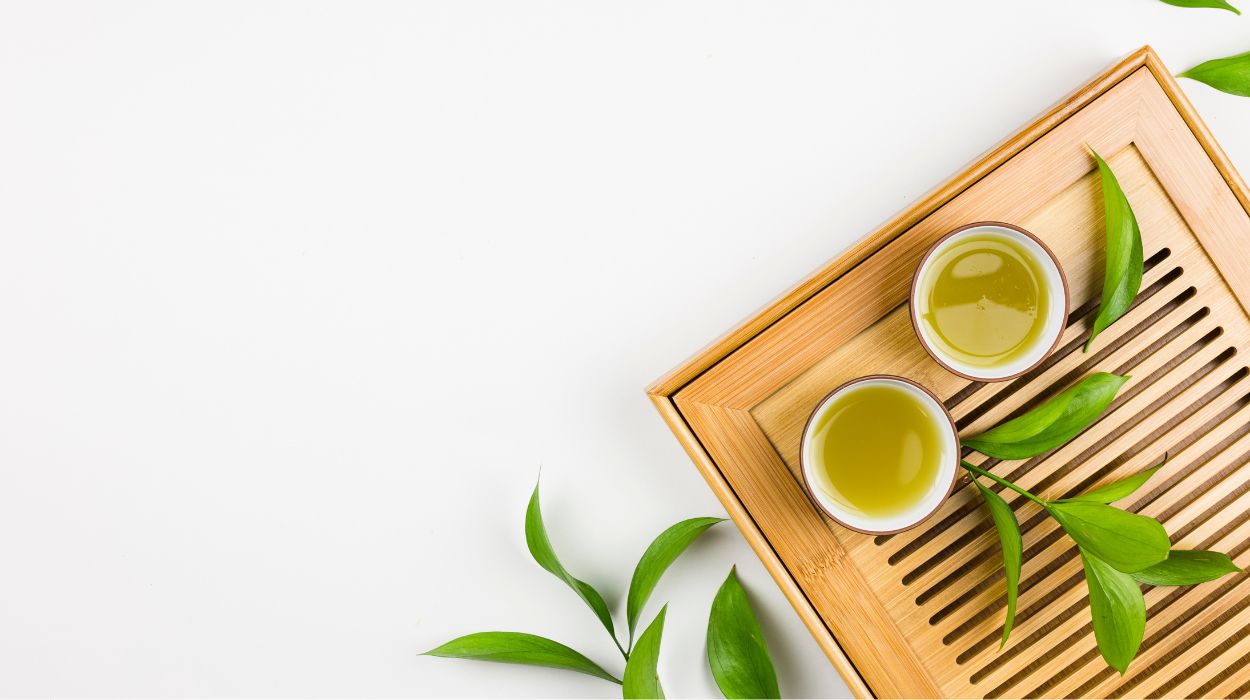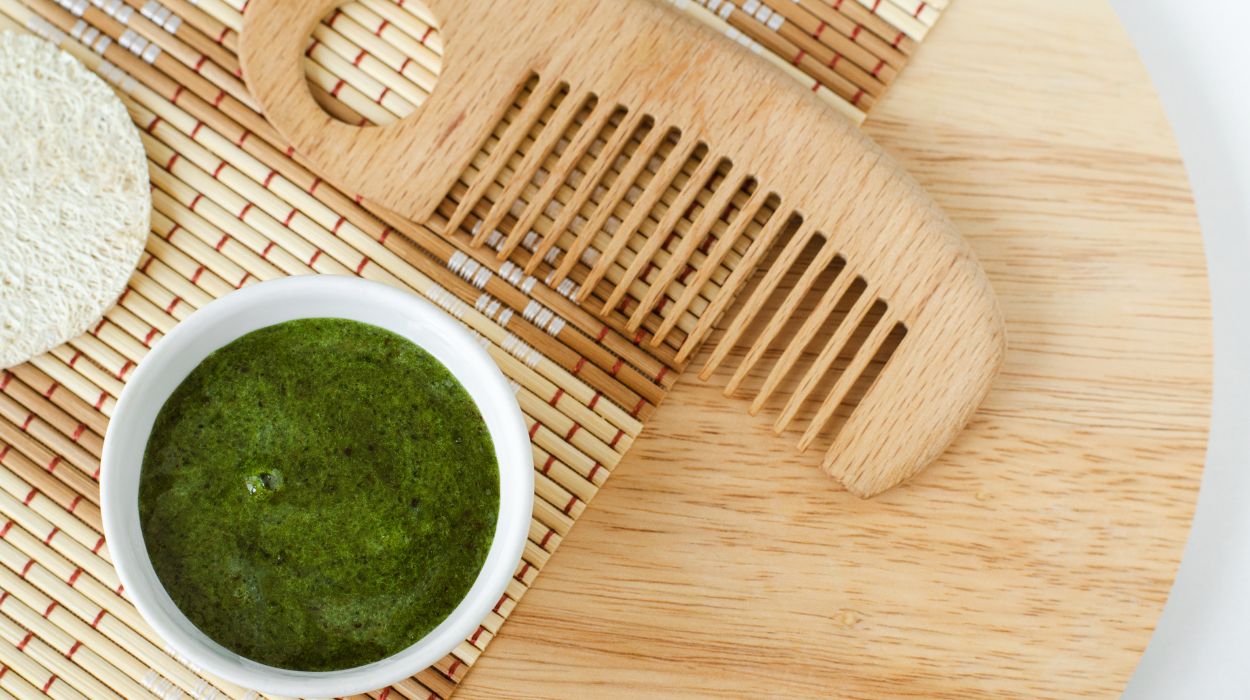 Expert's opinion
Expert's opinion
Expert's opinion
The article is a subjective view on this topic written by writers specializing in medical writing.
It may reflect on a personal journey surrounding struggles with an illness or medical condition, involve product comparisons, diet considerations, or other health-related opinions.
Although the view is entirely that of the writer, it is based on academic experiences and scientific research they have conducted; it is fact-checked by a team of degreed medical experts, and validated by sources attached to the article.
The numbers in parenthesis (1,2,3) will take you to clickable links to related scientific papers.
Green Tea For Hair: Benefits, Uses & Possible Side Effects In 2024

We’re always looking for the best all-natural options regarding skin and hair care.
The aisles are packed full of every herb and spice out there in lotions and shampoos, too. And it’s great because before, we had no idea just how many harmful chemicals[1] could be in your average product.
So, something as antioxidant-rich as green tea must be amazing, right? Or are all these new products just scams to get us to buy more?
Read on to learn what the science says about green tea for hair growth, plus the best treatments to try.
Amazing Green Tea Benefits For Hair
- Promote Hair Growth.
- Strengthen Hair Strands.
- Diminish Dandruff And Scalp Irritation.
- Add Shine And Luster.
- Protect Against Hair Loss.
Great Benefits Of Green Tea For Hair
Green tea is packed with antioxidants[2] that can help protect your hair follicles from damage caused by free radicals. These antioxidants promote a healthy scalp, which is exactly what you need for healthy hair growth.
Plus, it’s rich in the famous compound epigallocatechin gallate or EGCG. This catechin,[3] a type of plant compound, can help slow down hair loss. It might help decrease the activity of an enzyme[4] that contributes to hair loss.
EGCG can also help speed up the generation of new hair follicles, promoting hair growth.
Altogether, green tea benefits can work to:
Stimulate Hair Growth
The antioxidants in green tea improve blood circulation[5] and stimulate blood flow to the scalp. This lets more oxygen and nutrients get to the hair follicles, nourishing hair growth.
It also contains plant compounds called polyphenols that protect vitamin C, which synthesizes collagen — one of the main proteins in your blood vessels and skin that can support hair health. In the end, that means green tea stimulates your hair follicles and encourages hair regrowth.
Strengthen Hair Strands
The catechins in green tea strengthen the hair shaft, making it less prone to breakage and damage. This helps you grow stronger, more resilient hair[6] that’s less likely to get split ends or thin out.
Reduce Dandruff And Scalp Irritation
Green tea has natural anti-inflammatory[7] and antimicrobial properties that can help soothe an itchy, irritated scalp. It also helps regulate sebum production[8] — the natural oils your scalp produces. This can work to reduce overly greasy hair, dandruff, or scalp conditions like seborrheic dermatitis.
Add Shine And Luster
Green tea might even add some extra shine[5] to your hair. It could be because it smooths the hair cuticles, resulting in less frizz and hair that reflects light better. And that means you get a glossy, healthy shine in your locks.
Protect Against Hair Loss
Not only does EGCG help people with hair loss grow more hair, but it can even stop hair loss in the first place. It helps to keep your hormones in balance, mostly by preventing an enzyme that converts testosterone into dihydrotestosterone,[9] or DHT.
Whenever you have too much DHT, you have a higher chance of losing hair. So, sipping green tea or putting it on your hair can work to stop hair-thinning symptoms. This can help you keep those luscious locks.
Is Green Tea Good For Your Hair?

Using green tea for hair growth can dramatically affect your hair health.
Its famous plant compound, EGCG, can increase hair growth. Its anti-inflammatory properties stimulate hair follicles, preventing hair loss and helping to regrow hair.
You can benefit from drinking green tea daily or using a green tea rinse or hair mask. Of course, you must be careful not to overdo it, especially if you take green tea supplements.
But overall, it’s a great hair-loss treatment to add to your regular hair care routine.
How To Use Green Tea For Hair
Of course, just drinking green tea regularly is going to help give you overall health benefits. But if you want to use it topically as well, here are your options:
Shampoo
You can buy a shampoo with green tea extract and scrub it gently to ensure it gets through your scalp and strands. It won’t sit in your hair for long, so adding conditioners and masks helps.
Conditioner
There are plenty of conditioners that have green tea extract added, so grab one of those. Leave it in for at least a few minutes, so it has time to penetrate and work its magic.
Homemade Hair Rinse
Brew a strong cup of green tea, let it cool, and pour it over your freshly washed hair. Give your scalp a gentle massage since extra circulation can help it better absorb into your skin and hair roots.
Let it sit for at least 5 to 10 minutes so it penetrates your hair follicles and fully nourishes your scalp. Once the time’s up, rinse it out with some cool water and add your favorite conditioner.
Hair Mask

There are quite a few hair mask recipes, including green tea, but this one’s packed with nutrients.
Brew 2 tablespoons of loose green tea leaves, or 2 bags, in hot water for a few minutes, then let it cool. Meanwhile, mash a ripe banana until smooth, then mix in the cooled green tea. Then, add a tablespoon of honey and another coconut or argan oil.
Make sure your hair is clean and damp first. Then, section it and apply the green tea mask from your roots to your ends. Give your scalp a little massage for extra circulation, and let it sit for about 30 minutes.
Once you’re done, wash and condition it as usual and enjoy that pretty shine.
Possible Side Effects Of Green Tea On Hair
Since green tea is so famous for its antioxidant and energy-boosting benefits, green tea hair products have popped up everywhere. But just remember that something so strong can have side effects.
Liver Toxicity
If you’re buying green tea supplements or oils, you should know that they’re usually more potent. These high levels of EGCG can lead to liver toxicity.[10]
A safe amount is about 300 mg in supplements and 700 mg in brewed tea per day.
Stomach Pain
If you have too much, you might end up with stomach pain and some gastrointestinal issues[10] like nausea or diarrhea. Make sure you start with a small amount and slowly increase how much you drink as tolerated.
Anxiety
Just like caffeine, green tea’s energy-boosting effects can overload your nervous system. You might feel anxious,[11] nervous, or even get insomnia.
Overall, supplements are usually the strongest, so drinking weaker brews of tea is the safest way to go.
Finally, if you’re applying it to your skin, make sure you do a patch test first and wait 24 hours for the results.
Other Herbs That Stimulate Hair Growth
Some other herbs for hair that have been shown to support healthy hair growth are:
You can use them in their essential oil form and add a few drops when you shampoo, condition, or make a hair mask. Even other teas like ginger and hibiscus can be brewed and used as a homemade hair rinse. And while almost every herb is anti-inflammatory, these are some of the best for hair health.
Conclusion
So, is green tea good for your hair? Yes! As long as you use it safely.
Its plant compound, ECGC, has potent antioxidants that work by stimulating hair follicles. The cycle of skin and hair cells is also accelerated, leading to significant hair growth activity. Finally, it can also help balance hormonal issues like testosterone-induced hair loss.
Make sure to do a patch test first if you’re applying it topically. If you’re drinking it, start with a weak brew and limit it to one cup daily. For supplements, stay below 300 mg and watch out for signs like anxiety and upset stomach.
Overall, green tea for hair loss and strength is a great option. It helps your scalp stay healthy and gives hair follicles more oxygen and nutrients. That means strands grow more, and they grow stronger.
+ 10 sources
Health Canal avoids using tertiary references. We have strict sourcing guidelines and rely on peer-reviewed studies, academic researches from medical associations and institutions. To ensure the accuracy of articles in Health Canal, you can read more about the editorial process here
- Chiu, C.-H.T., Huang, S.-H. and Wang, H. (2015). A Review: Hair Health, Concerns of Shampoo Ingredients and Scalp Nourishing Treatments. [online] 16(12), pp.1045–1052. doi:https://doi.org/10.2174/1389201016666150817094447.
- Mani Iyer Prasanth, Nevin Sanlier, Chaiyavat Chaiyasut and Tewin Tencomnao (2019). A Review of the Role of Green Tea (Camellia sinensis) in Antiphotoaging, Stress Resistance, Neuroprotection, and Autophagy. [online] 11(2), pp.474–474. doi:https://doi.org/10.3390/nu11020474.
- Bhandari, R., Khanna, G. and Anurag Kuhad (2021). Prostate cancer and food-based antioxidants in India as plausible therapeutics. [online] pp.203–217. doi:https://doi.org/10.1016/b978-0-12-819547-5.00019-5.
- Zhang, H., Nan, W., Wang, S., Xingchao, S., Si, H., Li, T. and Li, G. (2018). Epigallocatechin-3-Gallate Promotes the Growth of Mink Hair Follicles Through Sonic Hedgehog and Protein Kinase B Signaling Pathways. [online] doi:https://doi.org/10.3389/fphar.2018.00674.
- Koch, W., Justyna Zagórska, Marzec, Z. and Wirginia Kukula-Koch (2019). Applications of Tea (Camellia sinensis) and its Active Constituents in Cosmetics. [online] 24(23), pp.4277–4277. doi:https://doi.org/10.3390/molecules24234277.
- Periyanaina Kesika, Nevin Sanlier, Subramanian Thangaleela, Bharathi Muruganantham and Chaiyavat Chaiyasut (2023). Role and Mechanisms of Phytochemicals in Hair Growth and Health. [online] 16(2), pp.206–206. doi:https://doi.org/10.3390/ph16020206.
- Davis, M., Piliang, M., Bergfeld, W.F., Caterino, T.L., Fisher, B.T., Sacha, J.B., Carr, G.J., Moulton, L.T., Whittenbarger, D.J. and Schwartz, J.H. (2021). Scalp application of antioxidants improves scalp condition and reduces hair shedding in a 24‐week randomized, double‐blind, placebo‐controlled clinical trial. [online] doi:https://doi.org/10.1111/ics.12734.
- Chanchanok Nualsri, Nattaya Lourith and Mayuree Kanlayavattanakul (2016). Development and clinical evaluation of green tea hair tonic for greasy scalp treatment. [online] ResearchGate. Available at: https://www.researchgate.net/publication/308149951_Development_and_clinical_evaluation_of_green_tea_hair_tonic_for_greasy_scalp_treatment.
- Shin, S., Kim, K., Myung Gyoon Lee, Lee, J.-J., Choi, S.-J., Kim, K.-S., Jung Min Ko, Han, H., Sung Wan Kim, Hae Jeong Youn, Kyu Joong Ahn, An, I.-S., An, S. and Hwa Jun Cha (2016). Epigallocatechin Gallate-Mediated Alteration of the MicroRNA Expression Profile in 5α-Dihydrotestosterone-Treated Human Dermal Papilla Cells. [online] 28(3), pp.327–327. doi:https://doi.org/10.5021/ad.2016.28.3.327.
- Hu, J., Webster, D., Cao, J. and Shao, A. (2018). The safety of green tea and green tea extract consumption in adults – Results of a systematic review. [online] 95, pp.412–433. doi:https://doi.org/10.1016/j.yrtph.2018.03.019.



